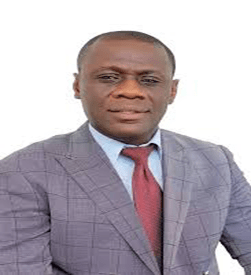By Samuel Lartey(Prof) [email protected]
The impending visit of the International Monetary Fund (IMF) delegation to Ghana on February 8, 2025, signals yet another chapter in the country’s long-standing collaboration with the global financial institution.
Over a five-day engagement, the IMF team is expected to deliberate with Ghanaian government officials on key economic matters, including the state of the economy, the 2025 Budget, external debt restructuring, and energy sector liabilities.
The discussions come at a critical time as Ghana navigates economic recovery following global financial disruptions, debt overhang, and fiscal constraints.
The government, under the leadership of Finance Minister Dr. Ato Forson, is keen on leveraging this engagement to sustain progress in economic stability while addressing macroeconomic vulnerabilities. The IMF’s role in Ghana’s economic landscape has been both historic and instrumental, dating back to the country’s first engagement in the 1960s.
A Historical Perspective: Ghana and the IMF
Ghana’s relationship with the IMF spans several decades, beginning with structural adjustment programs in the 1980s. The Economic Recovery Programme (ERP) of 1983, implemented under IMF guidance, sought to reverse the economic downturn Ghana faced in the late 1970s.
The program introduced stringent fiscal policies, market liberalization, and reforms that improved GDP growth from -6.9% in 1983 to 5.2% in 1984. Since then, Ghana has intermittently sought IMF support to address the balance of payment challenges and enhance economic resilience.
More recently, Ghana entered an IMF program in May 2023, securing a $3 billion Extended Credit Facility (ECF) to stabilize the economy. As of January 2025, the country has received approximately $1.9 billion in tranches, with further disbursements contingent on meeting fiscal and monetary benchmarks.
The IMF’s review in late 2024 indicated satisfactory progress, with Ghana’s economic growth exceeding projections, inflation declining to 24.2%, and improvements in both fiscal and external positions.
Implications of the IMF-Ghana Engagement on Economic Stability
This renewed engagement between Ghana and the IMF is poised to have significant impacts across multiple sectors, affecting public sector operations, businesses, and the general population.
Impact on Government Programs and Initiatives
The IMF’s collaboration ensures that Ghana’s fiscal policies align with macroeconomic stability goals. The 2025 Budget, set to be presented in March, will incorporate measures that support revenue mobilization while reducing excessive government borrowing.
One of the key areas of focus is Ghana’s external debt restructuring, which, if successfully managed, could lower Ghana’s debt-to-GDP ratio from 91.6% in 2023 to an estimated 80% by the end of 2025.
The IMF is also pushing for better public financial management, transparency, and the reduction of wasteful expenditures. Government initiatives such as the Ghana CARES (Obaatan Pa) program—designed to accelerate post-COVID recovery—stand to benefit from improved fiscal discipline and resource allocation. The IMF’s oversight ensures that Ghana can sustain these initiatives without undue fiscal strain.
Impact on Public Sector Operations
Public sector entities will experience enhanced fiscal accountability as government spending is monitored closely. Ministries, Departments, and Agencies (MDAs) will be required to align their budgetary allocations with IMF-prescribed efficiency measures.
Furthermore, the anticipated privatization of certain segments of the Electricity Company of Ghana (ECG) will be a critical topic in the IMF discussions, potentially leading to improved efficiency in the energy sector.
The energy sector remains a key concern, with accumulated debts exceeding $1.5 billion. The government is expected to outline strategies for addressing these liabilities, ensuring a more sustainable energy supply for businesses and households. The IMF’s guidance will help prevent recurring energy crises that have hampered industrial growth and economic activity in past decades.
Impact on Large, Medium, and Small Businesses
For businesses, economic stability translates into a more predictable investment climate. Large corporations will benefit from reduced inflationary pressures, allowing for better financial planning and risk management. As inflation drops further in 2025, businesses are likely to see a decline in operational costs, particularly in areas such as import duties and raw material procurement.
Medium and small enterprises (SMEs) form the backbone of Ghana’s economy, contributing over 70% to GDP. The IMF’s involvement in Ghana’s economic framework provides a more structured financial environment, enabling access to lower-interest credit facilities. The Ghanaian government, with IMF backing, may introduce SME-support initiatives such as tax incentives and capacity-building programs to drive innovation and job creation.
Impact on Ghanaian Citizens and Financial/Social Sectors
Economic stability has a direct effect on Ghanaian livelihoods. A well-structured 2025 Budget, aligned with IMF recommendations, should lead to improved social interventions such as the Livelihood Empowerment Against Poverty (LEAP) program and the National Health Insurance Scheme (NHIS). These programs are crucial in cushioning low-income earners from economic shocks.
Financial institutions will also benefit from a stabilized macroeconomic environment. The Bank of Ghana’s monetary policy, shaped by IMF guidelines, is likely to ensure a steady interest rate regime that supports both lenders and borrowers. The anticipated reduction in inflation will boost consumer purchasing power, enhancing household consumption and increasing demand for local goods and services.
Ghana’s Path to Sustainable Growth
While IMF interventions have historically been met with mixed reactions, the current collaboration underscores Ghana’s commitment to long-term economic stability. The government’s move to negotiate an extension of the IMF program is a strategic decision to secure additional funding and technical assistance for sustainable growth initiatives. However, this also requires balancing fiscal prudence with social development needs.
The IMF’s emphasis on revenue generation presents both opportunities and challenges. Ghana stands to lose approximately GH¢10 billion annually if certain taxes, such as the COVID-19 Levy and E-Levy, are removed. The government must therefore develop alternative revenue streams to offset potential deficits without overburdening citizens and businesses.
Conclusion
The upcoming IMF visit to Ghana represents a pivotal moment in the nation’s economic journey. As the country refines its fiscal policies and economic strategies, collaboration with the IMF provides a structured framework for sustainable development.
By ensuring prudent financial management, addressing energy sector liabilities, and fostering an enabling environment for businesses, this engagement will help Ghana navigate its economic challenges while positioning itself for long-term prosperity.
In the coming months, the government’s ability to implement sound economic policies, backed by IMF support, will determine the extent to which Ghana achieves its stability and growth objectives. With transparent governance, prudent fiscal management, and strategic economic planning, Ghana can leverage this IMF engagement as a stepping stone toward a resilient and thriving economy.









